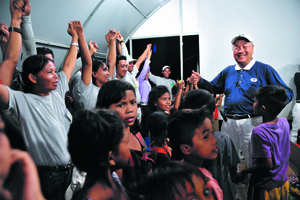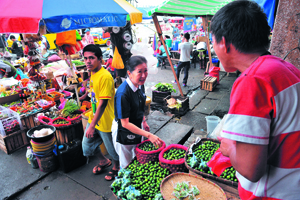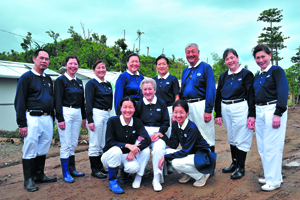

| His Own Home Has to Wait | ||||||||
He had had his home demolished in order to build a new one, but Typhoon Haiyan changed those plans. When the typhoon hit and devastated the central Philippines, the construction of his new home had to wait. In the aftermath of the storm, he and his family spent much of their time on Tzu Chi missions helping victims. This included building a new village in Palo. He and his family were still living in a rental unit in Manila when the village had been finished and 255 families had moved in, but it didn’t matter—their minds were at ease seeing the victims of the typhoon settled in their new homes. Tacloban was a big mess after Typhoon Haiyan. The streets were littered with debris and damaged goods that people had thrown out of their homes, snarling traffic in many places. It would be difficult for a city to recover from the disaster if people could not even get around easily. Even worse, garbage decaying in the hot, humid weather could contribute to epidemics of contagious diseases. To help out, Tzu Chi initiated a cash-for-work program in which residents were paid to clean up their own homes and the streets in their own neighborhoods. It started on November 20, 2013, and ended on December 13, during which time participants worked nearly 300,000 shifts and helped return their communities to normalcy.
Such a large-scale clean-up project created mountains of garbage, which required many loaders and dump trucks to clean up and haul away to city-designated dumping grounds. Without thorough logistical legwork beforehand, the project would not have been possible. The man behind much of that preparation was volunteer Henry Yunez (楊國英). With his business connections, Yunez managed to put together a fleet of 50 trucks, 40 of which were free for Tzu Chi to use. With the help of these trucks, Tacloban streets were quickly restored to service. Even before the clean-up project was done, Yunez and other volunteers began surveying damage to schools for a project to build light-duty classrooms. As soon as that was completed, without even stopping for a breather, he threw himself into the construction of a 255-unit village in Palo. In fact, he was busy with Tzu Chi aid efforts nonstop after Haiyan hit the Philippines. He does not remember how many times he flew from Manila, where he lived, to the disaster area. He also never tallied how much money he charged to his credit card for plane tickets, but one day in December 2014 he noticed that his airline membership had been automatically bumped up to premium class. His wife and two daughters were involved with the aid work for Haiyan victims too. The Yunez family put in a lot of effort to help survivors get back on their feet. Henry Yunez was born and raised in the Philippines, but his family hailed from Fujian Province, China. His father traded goods internationally, but he never made much money at it. Yunez remembers being so poor during childhood that his mother had to go to his school to apply for tuition subsidies.
Aside from a half-brother from his father, Yunez has seven sisters. His mother was very strict toward him, her only son. She saw nothing wrong with using corporal punishment when he did wrong. She wanted to bring up an upright son. After graduating from the University of Santo Tomas with a bachelor’s degree in electronic engineering, Yunez started an import business. Things were going really well for him. His business trips took him to all sorts of places, where he enjoyed eating all kinds of exotic foods. Prices were of no concern to him—his hosts were paying. Before long, he had become a gourmet consumer of all types of animal products, including raw fish, caviar, raw beef, and cow liver. His import business also presented him with ample exposure to racy sports cars, and sometimes he kept them for himself. At one time, he had 14 of them to give him the thrills that fast cars alone could deliver. The more profit he made, the more he invested in his business. He borrowed heavily from banks to purchase land, too. He worked hard for many years and amassed a large collection of assets. He was on top of the world. But then came the 1997 Asian financial crisis. From the top of the world, he fell into a very deep hole. The crisis quickly devalued his assets and sharply pushed up the interest rates on his debts. He humbly renegotiated repayment terms with his creditors. He had to sell one tract of land after another, suffering heavy losses, just to make the payments on his loans. “Those who had been most creditworthy were hit the hardest,” Yunez recalled, “because they had borrowed the heaviest.” Once an important client of banks, he now found himself hounded by debts.
IT WAS IN THIS DIFFICULT PERIOD of time that he encountered Tzu Chi. He would go alone to a volunteers’ gathering place, then located in a small apartment in Manila. He would sit there quietly among the people, listening and reflecting. He thought the group was all right, so he stayed with it. He helped in a weekly program to purchase medications and provide them free of charge to poor patients at Chinese General Hospital. He helped in free clinics. He even took his mother and daughters to join other volunteers on their visit to Master Cheng Yen in Hualien, Taiwan, in 1997. Yunez’s volunteering helped him escape from the gloom that the financial crisis had brought upon him. “I felt good when I served in the free clinics,” he said, “but once I was back in my office, my spirits sank.” Visiting the homes of the needy really gave him food for thought. One of the families they visited lived in a shack on the roof of another family’s house, with only a few metal sheets serving as the walls and roof. There was not even a door. The occupants covered the floor with flattened cardboard boxes. The structure was so small that the volunteers could hardly stand up straight in it. Another family they visited was crammed into a space of 110 square feet, which doubled as their grocery store. Even if there had been no furniture or anything else to take up space, there was barely enough room—14 square feet per person—in which the family of eight could sleep. Though it was common knowledge that there were many poor people in the country and that big gaps existed between the haves and the have-nots, Yunez was shocked by the poverty he witnessed. He had lived in affluence during most of his adult life. The sights of such poverty—unmasked and so close—really stunned him. Even though he had attended a Christian high school and a Catholic college, he had always been curious about the notion of reincarnation in Buddhism. “Why are there so many poor people in the Philippines?” he wondered. “Why do some people have such hard lives? And why do some people seem to have it all?” Through charitable service to others and in Buddhist literature, he found concrete answers to these questions. After joining Tzu Chi, Yunez gave up his love for gourmet food. He became the first vegetarian in his family. Over the last decade, his wife, two daughters, mother, several sisters, and a brother-in-law, ten of them in all, have followed in his footsteps and become Tzu Chi volunteers.
OVER THE YEARS, Yunez has helped in many large-scale Tzu Chi relief operations in the Philippines. He also contributed a lot when the foundation was helping rebuild schools in Bam, Iran, after a major earthquake devastated that city on December 26, 2003. Though Yunez’s mission to Bam was charitable, obtaining a visa proved quite difficult. But once he got it, he went to Bam no fewer than ten times in a span of three years. He would fly via Dubai to Tehran, where he changed planes for Bam. If the plane could not land in Bam, he had to land elsewhere and take ground transportation. Sometimes he had to spend the night in an airport while waiting for a connecting flight. The trips to Bam were not easy, so he made the best use of every moment that he was on the ground there. He would work nonstop checking the progress of the construction and meeting with contractors. Each round-trip airfare from Manila to Bam cost two thousand American dollars. Added to that were expenses for lodging and food. Even so, he willingly paid all those expenses out of his own pocket. He enjoyed volunteering for the foundation to deliver aid to people in need. During the domestic instability in the Philippines in the 1990s, many Filipinos of Chinese descent were kidnapped. If they could, most people in that ethnic group emigrated to safe havens like Australia, Canada, and United States. The Yunezes were no exception. At first, the danger of kidnapping seemed remote, something that only happened to others or in TV dramas. Yunez’s perception changed when several of his friends were kidnapped and had to pay ransom. For their safety, he sent his wife and three children to Canada, but he stayed behind to work. On the eve of their departure, Yunez told his children to return home after they finished their studies so they could serve the nation. Now both daughters have moved back to the Philippines. Like their parents, they have also become certified Tzu Chi volunteers. They now divide their time between their careers and volunteering. Henzie Yunez (楊嫻思), the older of the girls, spent more time at Palo than her father did. She stayed at the village as it was being built, worked with participants in the cash-for-work project, and taught children there to sing Tzu Chi songs, whose melodies soon filled the village as the children moved about. While helping Haiyan victims and working on the construction of the village, the Yunezes had to put a family affair on the back burner. They had planned to rebuild their family home, so they had had their old home demolished to make room. But then Typhoon Haiyan struck. The family decided to support Yunez as he devoted his energies to Tzu Chi aid projects for Haiyan victims, so they put off the construction of their own home for a while. It never occurred to them that construction would be postponed for more than a year. As their new home stood idle, without even its foundation completed, the Palo village was finished and 255 families moved into their new homes. Even though the Yunezes themselves still lived in a rental, their minds were at peace seeing victims settled in the new village. When the village was about finished, cash-for-work participants held a surprise farewell party for their beloved “Uncle Henry,” as Yunez was fondly known to them. Yunez, his hair having rapidly grayed over the year, and the villagers, their skins dark and tanned, sang heartily but wiped away tears now and again. They looked just like one big family. There seemed to be no distance between their hearts, a sign of true bonding that could only have been cultivated through a long periods of sincere companionship. At 65 years of age, Yunez has turned over many stones in search of something priceless, but he finally found it right at that moment—in the middle of songs, tears, and fellowship. |

















|




